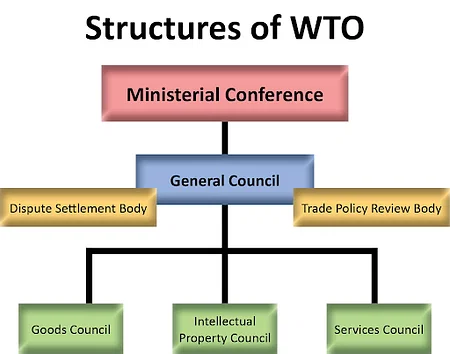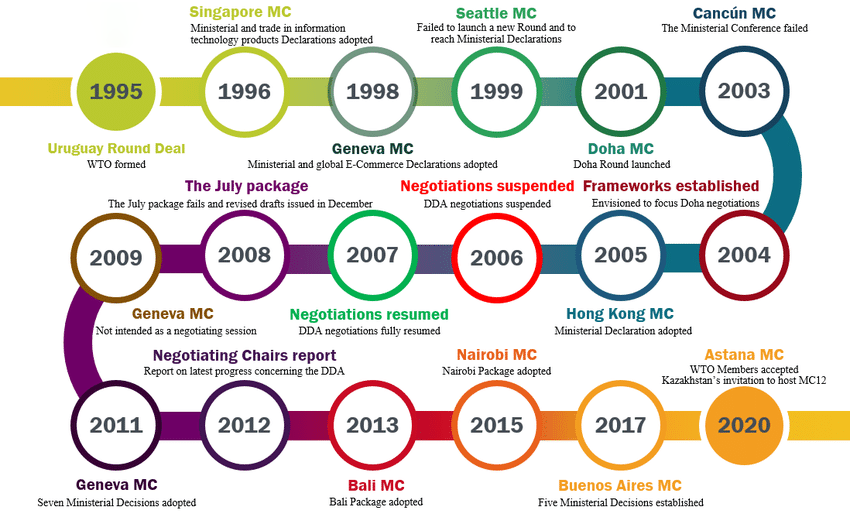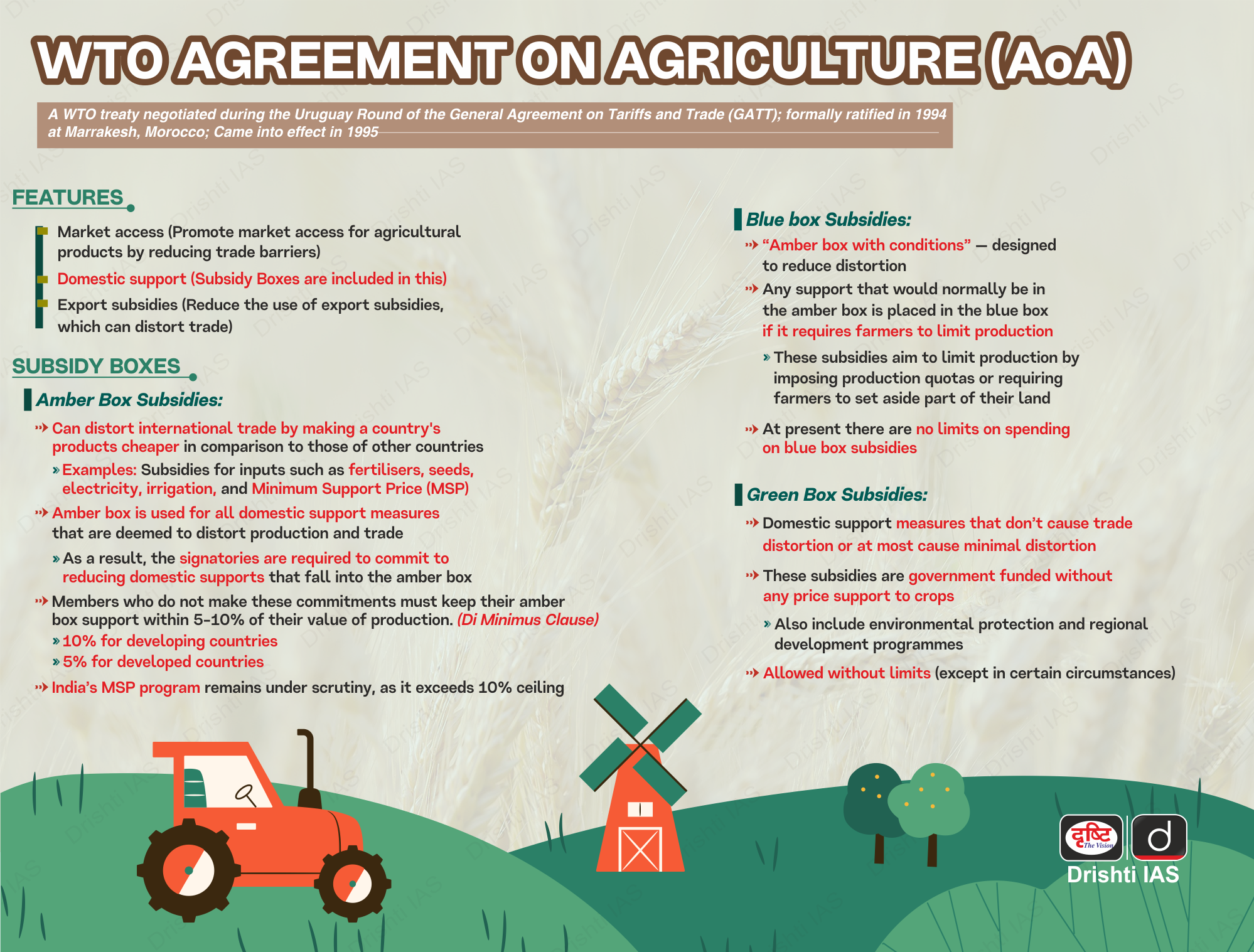International Relations
Tepid Trade-Offs: On the WTO 13th Ministerial Conference
This editorial is based on “Tepid trade-offs: On the WTO 13th Ministerial Conference (MC13) in Abu Dhabi” which was published in The Hindu on 05/03/2024. The article assesses the significant outcomes and associated challenges emerging from the 13th Ministerial Conference (MC13) held recently in Abu Dhabi.
For Prelims: WTO, WTO Ministerial Conference, TRIPS Agreement, Covid‑19, Intellectual Property Rights (IPR) Regime, Agreement on Fisheries Subsidies (AFS), Special and Differential Treatment (S&D), Least developed countries (LDCs), Green Climate Fund.
For Mains: Key Outcomes of the 13th WTO Ministerial Conference, Challenges Undermining the World Trade Organization’s (WTO) Effectiveness, Concerns of India Within the World Trade Organization.
Recently, the 13th Ministerial Conference (MC13) of the World Trade Organization took place in Abu Dhabi, UAE. Ministers from diverse levels of development and varying geopolitical perspectives convened to address a wide array of crucial subjects, including but not limited to food security, e-commerce, fisheries subsidies, WTO reform, domestic regulations of services, and investment facilitation.
Despite efforts to tackle global trade challenges, the conference concluded with minimal progress despite prolonged discussions.
What is the WTO Ministerial Conference?
- About:
- The WTO Ministerial Conference is a gathering of representatives from member countries of the World Trade Organization (WTO).
- It serves as the highest decision-making body of the WTO and the conference typically convenes every two years.
- Objectives:
- The conference sets the agenda for the organisation's activities and negotiations.
- Discussions and negotiations on various trade-related topics such as market access, subsidies, and dispute resolution.
- Formulating policies to enhance global trade and economic cooperation.
- Facilitating agreements among member countries on trade rules and regulations
- The conference may result in agreements or declarations that guide member countries' trade policies.
- Development of action plans to address specific challenges identified during the conference.
What are the Key Outcomes of WTO’s 13th Ministerial Conference?
- Accessions:
- Ministers endorsed the accession to the WTO of two least-developed countries—Comoros and Timor-Leste. This brings the organisation’s Membership to 166, representing 98% of world trade.
- Reform of the Deliberative and Negotiating Functions:
- At MC13, ministers welcomed the work already undertaken to:
- Improve the functioning of WTO Councils, Committees, and Negotiating Groups,
- Enhance the organisation’s efficiency and effectiveness, and
- Facilitate Members’ participation in WTO work.
- They instructed officials to continue their “reform by doing” process and to report progress to the 14th Ministerial Conference (MC14).
- At MC13, ministers renewed their commitment to achieve a fully functional dispute settlement system accessible to all Members by 2024.
- At MC13, ministers welcomed the work already undertaken to:
- E-Commerce:
- At MC13, ministers decided to renew the e‑commerce moratorium until MC14 or 31 March 2026, whichever is earlier.
- TRIPS Non-Violation and Situation Complaints:
- In a decision that has often been linked to the e‑commerce moratorium, ministers also decided to extend a moratorium on so-called “non-violation” and “situation” complaints under the TRIPS Agreement.
- Such complaints would otherwise allow Members to challenge, in WTO dispute settlement, IP-related measures that are not inconsistent with TRIPS obligations but that nonetheless undermine benefits expected from the agreement.
- Covid COVID-19-related TRIPS Waiver:
- At MC12, ministers adopted special rules that broadened the availability of compulsory licences for the production of Covid‑19 vaccines. They also mandated negotiations on whether to expand the product coverage of these special rules to Covid-19 diagnostics and therapeutics.
- At MC13, ministers took note of the work undertaken and the lack of a consensus on expanding the product scope. Accordingly, these special rules are not going to apply to compulsory licences for the production of Covid‑19 diagnostics and therapeutics.
- Special and Differential Treatment:
- Ministers adopted a decision to improve the use of special and differential treatment (S&DT) provisions, in particular those in the Agreement on Technical Barriers to Trade and the Agreement on Sanitary and Phytosanitary Measures.
- Plurilateral Agreements and Initiatives:
- WTO Plurilateral initiatives are discussions at the WTO in which only a subset of Members are participating. They can aim to create new rules, secure mutual liberalisation of tariffs, create a new process or launch a conversation.
- At MC13, several such plurilateral initiates reached agreements or reported on the results of their work in important areas.
- An important plurilateral initiative concerns Investment Facilitation for Development (IFD).
- Domestic Regulation of Services:
- A commercially significant outcome of MC13 was the agreement reached on implementing new disciplines for domestic regulation of services, integrating them into the WTO framework.
- These disciplines are designed to facilitate trade in services by streamlining and simplifying regulatory procedures.
- Sustainability-Related Initiatives:
- Members have also come together in different groupings to work on a series of sustainability-related initiatives.
- The Dialogue on Plastics Pollution and Environmentally Sustainable Plastics Trade, an initiative comprising 78 Members, identified trade and trade-related measures and policies to reduce plastics pollution.
- Finally, 48 Members reported on progress toward Fossil Fuel Subsidy Reform.
- Fisheries Subsidies:
- At MC12, members concluded an Agreement on Fisheries Subsidies (AFS) which prohibits the granting or maintaining of subsidies to entities involved in illegal, unreported, and unregulated (IUU) fishing or the fishing of overfished stocks.
- At MC13, ministers welcomed the progress over the past 20 months towards the AFS’s entry into force. As of 1 March 2024, 71 Members have ratified the agreement.
What Challenges are Currently Undermining the WTO’s Effectiveness?
- Erosion of Multilateralism:
- There has been a noticeable erosion of multilateralism in recent years, with increasing trade disputes and the rise of unilateral trade actions.
- This trend undermines the effectiveness of the WTO as a forum for resolving trade conflicts and negotiating trade agreements.
- The MC13 also failed to make progress on key issues like fisheries subsidies, reflecting serious divisions among 166 member countries.
- Protectionism and Trade Wars:
- The proliferation of tariffs, quotas, and other trade barriers undermines the principles of free trade and poses a threat to the rules-based trading system.
- For instance, the trade dispute between the US and China has strained the multilateral trading system and challenged the WTO's ability to mediate and resolve such conflicts.
- Dispute Settlement Mechanism Crisis:
- The WTO's dispute settlement mechanism, often regarded as the crown jewel of the organisation, has faced a crisis in recent years.
- The Appellate Body, responsible for adjudicating trade disputes, has been rendered dysfunctional due to the US’ blocking of new appointments to the body.
- The absence of a functioning dispute settlement mechanism erodes confidence in the multilateral trading system and encourages unilateralism.
- Development Divide and Special and Differential Treatment:
- Despite the principle of Special and Differential Treatment (S&D) aimed at providing flexibility and support to developing nations, disparities persist in their capacity to participate effectively in trade negotiations and implement trade-related reforms.
- Least-developed countries (LDCs) often lack the resources and technical assistance needed to capitalise on trade opportunities, perpetuating their marginalisation in the global economy.
- Digital Trade and E-commerce:
- The rapid growth of digital trade and e-commerce presents both opportunities and challenges for the WTO. While digital technologies have the potential to enhance trade efficiency and facilitate economic growth, they also raise new regulatory and policy issues that fall outside the scope of traditional trade agreements.
- The WTO faces the challenge of adapting its rules and agreements to accommodate the evolving nature of digital trade while ensuring a level playing field for all member countries.
- Environmental and Sustainability Concerns:
- The WTO faces growing pressure to incorporate environmental and sustainability considerations into its trade rules and agreements. Climate change, biodiversity loss, and other environmental challenges have significant implications for global trade patterns and practices.
- Balancing environmental objectives with trade liberalisation goals requires innovative approaches and cooperation among WTO members to develop rules that promote both economic growth and environmental sustainability.
- Public Health and Access to Medicines:
- The Covid-19 pandemic has highlighted the importance of public health considerations in trade policy. Access to affordable medicines and medical supplies has become a critical issue, particularly for developing countries facing challenges in procuring essential healthcare products.
- The WTO faces the challenge of reconciling intellectual property rights with the need to ensure access to medicines for all, particularly during public health emergencies.
- Agriculture and Food Security;
- Although updating WTO disciplines on agriculture has been on the agenda of Members since 2000, little progress has been made. At MC13, members failed again to reach a consensus on the scope, balance, and timeline of agriculture negotiations.
- This failure resulted, in particular, from broad disagreement over the issue of “public stockholding for food security purposes”.
What are India’s Primary Concerns within the WTO?
- Agricultural Subsidies and Food Security:
- India is deeply concerned about the impact of agricultural subsidies and domestic support measures adopted by developed countries on its farmers' livelihoods and food security.
- India has been vocal about the need for a permanent solution on public stockholding for food security purposes, allowing developing countries to subsidise agricultural production without facing trade sanctions.
- This issue gained prominence during the WTO's negotiations on the Agreement on Agriculture, where India sought to safeguard its food security programs from being challenged under WTO rules.
- Market Access and Non-Tariff Barriers:
- India seeks improved market access for its goods and services in developed countries, coupled with measures to address non-tariff barriers that impede its exports.
- Non-tariff barriers such as technical regulations, sanitary and phytosanitary measures, and restrictive licensing procedures disproportionately affect India's export competitiveness.
- India emphasised a cautious and calibrated approach to trade negotiations, ensuring adherence to WTO principles while addressing concerns about non-trade issues, such as the EU's Carbon Border Adjustment Mechanism.
- India seeks improved market access for its goods and services in developed countries, coupled with measures to address non-tariff barriers that impede its exports.
- Intellectual Property Rights (IPR) Regime:
- India advocates for a balanced and development-oriented intellectual property rights regime within the WTO framework. It seeks to safeguard its ability to promote access to affordable medicines, foster innovation, and protect traditional knowledge and biodiversity.
- A notable example is India's stance on the TRIPS agreement, where it has advocated for flexibilities and safeguards to ensure access to essential medicines for its population.
- USA Obstructing India’s Initiatives:
- The disputes where India is a complaining party are:
- Countervailing duty by the US on Indian steel products
- Measures by the US concerning non-immigrant visas
- Renewable energy programmes of the US
- Import duties imposed on steel and aluminium products by US
- WTO disputes where India is a responding party include:
- Prohibition by India on the import of poultry and poultry products filed by the US
- Import duties on certain information and communication technology goods filed by the EU, Japan, and Taiwan.
- The disputes where India is a complaining party are:
- Special and Differential Treatment (S&D):
- India insists on the effective implementation of S&D provisions across all areas of WTO agreements to ensure that developing countries can fully benefit from the multilateral trading system.
- For instance, India has advocated for differential treatment in the areas of tariff reduction commitments, trade facilitation measures, and dispute settlement procedures to address asymmetries in global trade relations.
What Reforms are Necessary in the World Trade Organization (WTO)?
- Revitalising Dispute Settlement Mechanism:
- Restoring the functionality of the Appellate Body is crucial to ensuring the timely and effective resolution of trade disputes.
- Immediate action is needed to address the deadlock in appointing new members to the Appellate Body and to uphold the integrity of the WTO's dispute settlement mechanism.
- Suitable Provision For Punishment:
- If a country has done something wrong, it should swiftly correct its faults. And if it continues to break an agreement, it should offer compensation or face a suitable response that has some remedy — although this is not actually a punishment: it’s a “remedy”, the ultimate goal being for the country to comply with the ruling.
- Such countries can be mandated to submit mandatorily a particular amount to the Green Climate Fund if found on the wrong side.
- Updating Trade Rules to Reflect Modern Realities:
- The WTO's rules and agreements need to be updated to address emerging issues such as digital trade, e-commerce, and environmental sustainability.
- Immediate reforms should focus on modernising trade rules to accommodate new technologies, promote sustainable development, and facilitate inclusive economic growth.
- Strengthening S&D Provisions:
- Enhancing the effectiveness of S&D provisions is essential to support the development objectives of developing and least developed countries (LDCs).
- Immediate reforms should aim to make S&D provisions more operational and responsive to the specific needs and challenges faced by developing countries, particularly in areas such as agriculture, IPRs, and services trade.
- Addressing Trade Distortions and Subsidies:
- Urgent action is needed to address trade-distorting practices, including subsidies that distort market competition and undermine fair trade.
- Reforms should focus on strengthening disciplines on subsidies and other forms of government support to ensure a level playing field for all WTO members.
- Promoting Inclusive Decision-Making:
- Ensuring inclusive decision-making processes within the WTO is essential to strengthen its legitimacy and effectiveness.
- Immediate reforms should focus on promoting greater participation and representation of all member countries, including developing and LDCs, in WTO negotiations, committees, and decision-making bodies.
Conclusion
The World Trade Organization (WTO) must undertake visionary reforms to sustain its legitimacy and central role in the rapidly evolving global economy. This entails prioritising inclusivity to ensure the voices of all member countries are heard, adapting swiftly to emerging challenges and opportunities through modernisation and innovation, and upholding transparency and accountability to build trust among stakeholders.
|
Drishti Mains Question: Examine the achievements and shortcomings of the 13th Ministerial Conference of the World Trade Organization (WTO). Propose strategies for WTO reform to ensure its continued relevance in the evolving global landscape. |
UPSC Civil Services Examination, Previous Year Questions (PYQs)
Prelims:
Q1. The terms ‘Agreement on Agriculture’, ‘Agreement on the Application of Sanitary and Phytosanitary Measures’ and ‘Peace Clause’ appear in the news frequently in the context of the affairs of the (2015)
(a) Food and Agriculture Organization
(b) United Nations Framework Conference on Climate Change
(c) World Trade Organization
(d) United Nations Environment Programme
Ans: C
Q2. In the context of which of the following do you sometimes find the terms ‘amber box, blue box and green box’ in the news? (2016)
(a) WTO affairs
(b) SAARC affairs
(c) UNFCCC affairs
(d) India-EU negotiations on FTA
Ans: A
Mains:
Q1. What are the key areas of reform if the WTO has to survive in the present context of ‘Trade War’, especially keeping in mind the interest of India? (2018)
Q2. “The broader aims and objectives of WTO are to manage and promote international trade in the era of globalisation. But the Doha round of negotiations seem doomed due to differences between the developed and the developing countries.” Discuss in the Indian perspective. (2016)







